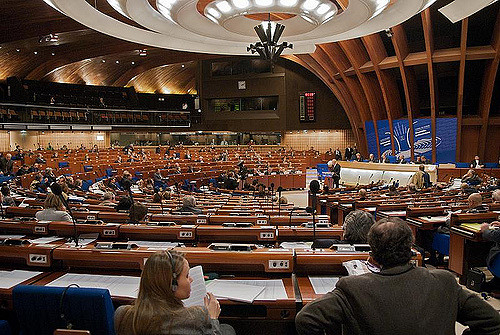The head of Ukraine's delegation to the Parliamentary Assembly of the Council of Europe (PACE) Volodymyr Ariev has informed that 20 countries from the organization signed a declaration calling to stop efforts to restore the Russian delegation at PACE. The Ukrainian MP informed about this on his facebook page on 15 December, noting that initially 19 countries signed the statement, but later Slovakia joined the delegates of Denmark, Estonia, Georgia, Germany, Ireland, Latvia, Lithuania, Luxembourg, Malta, Moldova, The Netherlands, Poland, Portugal, Romania, Slovenia, Spain, Sweden, United Kingdom, and Ukraine.
Altogether, there are 34 signatories. The document was published on the site of the Council of Europe on 19 December.
The declaration states that PACE decision remain a powerful tool in defending human rights, democracy, and the rule of law, and stresses that the strength of PACE decisions is dependent on the Authority of the Assembly.
"Any attempt to restore the Russian Federation in the Assembly without the implementation of the resolutions adopted in response to the Russian aggression against Ukraine will shatter the institutional credibility of the Assembly and will cause a domino effect. Political expediency or financial viability cannot substitute the principles of the rule of law when it comes to the foundations of the Council of Europe," the declaration states.
Its signatories regret that "certain forces are trying to undermine the authority of the Assembly and the Council of Europe as a whole"
and urge all members of the Assembly to stop the scenario of the return of the Russian delegation.
Delegates to PACE from 19 member states have signed strong declaration condemning attempts to restore Russian delegation to the Assembly unconditionally. @coe @PACE_News @CoESpokesperson pic.twitter.com/yPZtjTYR7L
— Volodymyr Ariev (@VolodymyrAriev) December 15, 2017
As reported, the Parliamentary Assembly of the Council of Europe adopted a decision aimed at lifting political sanctions against the Russian Federation. The proponents of the resolution argue that it’s unacceptable having a Council of Europe member which doesn’t pay its membership fees, which Russia cut down on after being denied the right to vote over its aggression in Ukraine. Council of Europe Secretary-General Thornbjorn Jagland, a man with distinct KGB past, told PACE delegates that the Council of Europe faces a difficult decision: to uphold its values or preserve the unity of the organization: the Russian delegation announced it would withdraw from the Assembly if sanctions were not lifted, and consequently, would stop paying membership fees, be excluded from the organization, and the Council of Europe would stop existing in its present form. Jagland has also argued Russia needs to return to PACE in order to vote for the senior officials of the Council of Europe, including for the judges of the European Court of Human Rights and the new Commissioner of Human rights. If this doesn’t happen, he says, the human rights protections of 130 million Russians will suffer, as they will be unable to lodge complaints to the European Court of Human Rights. The decision to return Russia back to the table will be debated at a PACE session in January 2018 in Strasbourg.
This proposal to reinstate Russia’s right to vote in Europe’s leading human rights organization takes place against the backdrop of Russia ignoring the PACE resolutions adopted in response to its occupation of Crimea and aggression in Ukraine, and despite the latest one, adopted in 2016, stating that dialogue with Russia can only be restored after “significant and measurable progress towards the implementation (of previous resolutions).”
The initiative has been sharply protested by European intellectuals, Crimean Tatar leaders, and Ukrainian NGOs
, who warned that this will destroy the Council of Europe as an organization capable of guarding human rights and freedoms in Europe, and would make members of the Parliamentary Assembly of the Council of Europe (PACE) share responsibility for Russia’s human rights abuses in occupied Crimea.
/This article was updated to include the link to the published document on the site of the Council of Europe.
Read also:
- The treason of Europe: PACE adopts resolution allowing to lift political sanctions
- Giving into Russian blackmail will destroy Council of Europe: European intellectuals, Crimean Tatar leaders, Ukrainian NGOs
- Russia’s participation in PACE meeting protested in Madrid
- They called him “Yuriy”: the KGB past of the man who advocates restoring Russia at PACE
- How the head of PACE became Putin’s lackey
- PACE calls on Russia to release Sentsov and other Kremlin hostages

